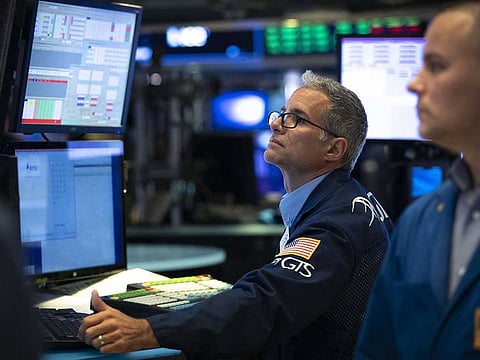Markets on wobbly footing as COVID-related doubts persist
Sentiment to ease in weeks ahead as Q3 company earnings to come in not as bad

Dubai: As markets worldwide cautiously await the fast-approaching elections in the world’s top economy, skewing the balance are topics surrounding further monetary stimulus and a surging number of new COVID-19 infections.
Global equities advanced last week amid growing expectations the Democratic Party will win US elections next month, which also revived investor hopes for more economic stimulus in the economy.
Gains on key indices worldwide were supported by reports of improvements in President Donald Trump’s health after he tested positive for COVID-19, although trading has been choppy amid uncertainties about the November election. Moreover, positive earnings reports in some parts helped limit key benchmark losses.
However, this was not before a brief spell of selloffs ensued on doubts over US stimulus, with blue-chip shares weighing the most on Wall Street, triggered by President Trump calling off talks over a coronavirus relief package until after the election.
Eye on upcoming earnings
While good business news has been in short supply, investors may take slight comfort in coming weeks from US corporate earnings that are likely to be bad, but not as bad as they have been.
Analysts expect third-quarter S&P 500 earnings to have fallen 21 per cent compared with the year-ago quarter, a big improvement from second-quarter’s 30.6 per cent drop that was most likely the low point for earnings this year because of coronavirus-fuelled lockdowns.
Earnings reporting will get rolling next week with results from some of the big US banks, likely impacted by near record low interest rates and the pandemic-induced recession. JPMorgan & Co. and Citigroup both release results on Tuesday.
Better-than-expected earnings?
Overall, S&P 500 quarterly results tend to beat analysts’ cautious expectations, and they could do that even more than usual this reporting season, strategists said.
In a break from the typical trend, guidance from US companies has been more positive than negative and estimates have been improving in recent weeks to reflect more upbeat guidance. Whether that will be enough to support stocks in the weeks ahead is up for debate.
Companies that have reported so far on the quarter have not seen much cheer from investors, despite their much stronger-than-expected results, some strategists have noted.
US stocks on wobbly path
US stocks registered sharp gains for the third quarter, but they fell in September in the first monthly decline since March, when the coronavirus began its rapid spread across the United States.
For investors and Wall Street analysts, the reality of the damage to the economy, several weeks after the initial round of fiscal support expired and persistent rise in unemployment may indeed seem like a spectacle.
Analysts do believe that some sort of stimulus package will be enacted eventually. And so does the stock market, which has been gravitating toward areas investors expect to benefit under Democratic leadership after the November elections, like the energy sector.
UAE, Gulf markets in tug-of-war trade mode
Alongside UAE bourses, major stock markets in the Gulf started of the week in largely mixed trading, as uncertainties that persisted on a global level did not show any sign of receding in the weeks to come.
Dubai’s main share index (DFM) edged up 0.4 per cent, supported by a 1.7 per cent rise in Aramex and a 1.5 per cent increase in Emirates Integrated Telecommunications (du).
On the other hand, Abu Dhabi index (ADX) lost 0.4 per cent, with First Abu Dhabi Bank, the UAE’s largest lender, dropping 0.5 per cent and telecoms firm Etisalat slipped 0.4 per cent.
On Thursday, logistics giant Aramex said it will book provisions of $15.1 million (Dh55.5 million) for damage caused to its warehouse facility in Beirut and partial damage to three storage chambers in Casablanca, but said it maintains insurance coverage policies which should cover both incidents.
A worsening global oil demand outlook will prompt OPEC to reverse a planned easing of oil cuts in 2021 with Saudi Arabia offering deeper cuts below its current quota, J.P. Morgan said on Friday in a research note.
Elsewhere, the GCC region’s largest bourse, Saudi Arabia’s Tadawul, rose 0.6 per cent, while in Qatar, its QSI index declined 0.6 per cent.







